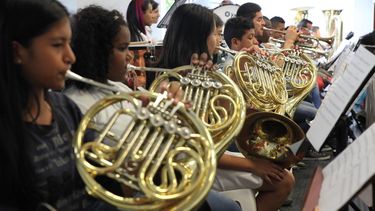Creative action and interaction
Investigating social and cognitive aspects of creative behaviours.

This research theme investigates creative behaviours and the ways in which art is produced for professional and everyday purposes. It explores the dynamics between groups and individuals, past and present, fantasy and embodiment. Here are some examples:
Group communication and group performance
This group of projects investigates processes of group communication and synchronisation within and across rehearsals, addressing questions such as how creative groups self-organise and manage their practice and rehearsal to prepare for a high quality outcome across a period of weeks and months, how is leadership and agency distributed across members of an ensemble, what processes enable group synchronisation and coordination and how may this be different depending on musical genres, goals and styles?
Selected publications:
Pennill, N., & Timmers, R. (2022). Patterns of verbal interaction in newly formed music ensembles. Frontiers in Psychology, 13, 987775.
Schiavio, A., Meissner, H., & Timmers, R. (2024). Influences of Physical and Imagined Others in Music Students’ Experiences of Practice and Performance. In Bogunović, B., Timmers, R., & Nikolić, S. (2024). Psychological Perspectives on Musical Experiences and Skills: Research in the Western Balkans and Western Europe. Open Book Publishers.
Timmers, R., Bailes, F., & Daffern, H. (Eds, 2022). Together in music: Coordination, expression, participation. Oxford University Press.
The feedback loop of empathy and synchronisation
Empathising with others and synchronising with their movements are essential aspects of human behaviour in social interactions, both involving alignment with others’ actions and feelings. Existing research has observed an impact of one process on the other, noting how empathy contributes to the socio-cognitive skills required for synchrony and how synchronised interactions facilitate the development of empathy. However, these studies have examined these effects independently, overlooking a potential bidirectional relationship between empathy and synchrony.
Our project focuses on this relationship, proposing a theoretical framework that suggests that during musical interactions, empathy and synchrony create a positive feedback loop, mutually enhancing one another. Specifically, it is proposed that individuals utilise their empathic skills to predict their partners’ movements and synchronise with them. This attained synchrony enhances social bonding among partners, fostering emotional understanding and empathising. This enhanced empathy, in turn, further promotes interpersonal synchrony, continuing the positive feedback loop.
The project has so far resulted in three papers. Paper 1 reviewed the existing literature, presented the framework, and discussed potential contextual and inter-individual factors that might enhance or hinder the functioning of the feedback loop. Paper 2 and paper 3 (currently under peer review) focused on musical interactions between adult and child musical novices, testing empirically central predictions of the framework. The studies utilised mixed-methods approaches and examined a variety of populations to address critical knowledge gaps and provide empirical evidence for crucial unidirectional aspects of the feedback loop model. Their results suggest that empathy enhances the social bonding experience stemming from synchronous interactions in adults and facilitates interpersonal synchrony in children. Additionally, findings show that synchrony facilitates empathising between children following brief musical encounters, implying that synchronising provides social cues directing attention to partners’ movements and feelings.
Overall, the project has deepened our understanding of the complex relationship between synchrony and empathy, laying the groundwork for future empirical investigations focusing directly on the bidirectional nature of those two processes. This work also promotes new perspectives on the intertwined dynamics of social and musical behaviour, advocating for a shift from a unilateral to a bidirectional research focus and highlighting significant implications for music education.
Selected publications:
Tzanaki, P. (2022). The positive feedback loop of empathy and interpersonal synchronisation: discussing a theoretical model and its implications for musical and social development. Music & Science, 5, 20592043221142715.
Modes of participation, learning and development in creative arts activities
Practices, underpinning skills, experiences and infrastructure are investigated in different participatory art forms with the goal of advancing understanding and supporting the flourishing and application of participatory arts. A recently completed research project includes a collaboration with the organisation Unforgettable Experiences to investigate modes of participation in online workshops. The project compared different art forms and developments across the weeks of participation. Findings can help participants make informed decisions about the type of engagement they are interested in and how this is offered by different creative arts activities. The findings also offer insight and feedback to creative art facilitators, supporting reflection and development.
Related projects concern the teaching, learning and rehearsing practices of music. In the edited volume Sound Teaching for example, implications are considered for education and music performance practice of research in music psychology conducted at Sheffield. The chapters consider building performance confidence, scaffolding expressive performance in young musicians using dialogic teaching approaches, learning to improvise in classical performance styles, and case studies of children with hearing loss participating in a signing and singing choir.
Selected publications:
Perdomo-Guevara, E., & Dibben, N. (2024). Cultivating meaning and self-transcendence to increase positive emotions and decrease anxiety in music performance. Psychology of Music, 03057356241246052.
Meissner, H., & Timmers, R. (2020). Young musicians' learning of expressive performance: the importance of dialogic teaching and modeling. In Frontiers in Education, 5, https://doi.org/10.3389/feduc.2020.00011
Meissner, H., Timmers, R., & Pitts, S. E. (Eds, 2022). Sound Teaching: a research-informed approach to inspiring confidence, skills and enjoyment in music performance. Routledge.
Schiavio, A., van der Schyff, D., Kruse-Weber, S., & Timmers, R. (2017). When the sound becomes the goal. 4E cognition and teleomusicality in early infancy. Frontiers in psychology, 8, 1585.
